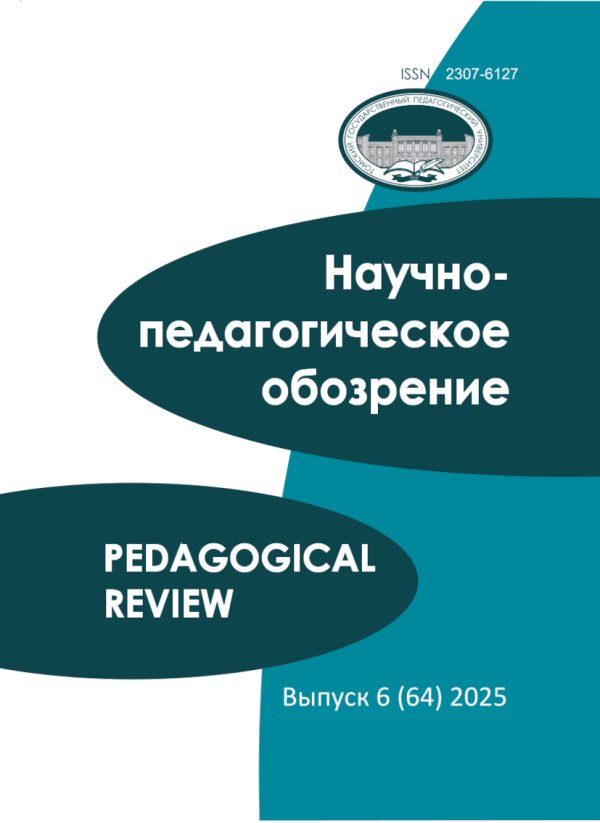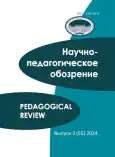Короткая версия опросника самоконтроля в общении: надежность, валидность, факторная структура
- Авторы: Шейнов В.П.1, Девицын А.С.2
-
Учреждения:
- Республиканский институт высшей школы
- Белорусский государственный университет
- Выпуск: № 3 (2024)
- Страницы: 124-135
- Раздел: ПСИХОЛОГИЯ
- URL: https://journal-vniispk.ru/2307-6127/article/view/269613
- DOI: https://doi.org/10.23951/2307-6127-2024-3-124-135
- ID: 269613
Цитировать
Полный текст
Аннотация
Об авторах
Виктор Павлович Шейнов
Республиканский институт высшей школы
Email: sheinov1@mail.ru
доктор социологических наук, профессор, профессор кафедры психологии и педагогического мастерства Минск, Беларусь
Антон Сергеевич Девицын
Белорусский государственный университет
Email: a.dziavitsyn@gmail.com
старший преподаватель кафедры веб-технологий и компьютерного моделирования Минск, Беларусь
Список литературы
- Шейнов В. П. Связи зависимости от смартфона с состояниями и свойствами личности // Журнал Белорусского государственного университета. Социология. 2020. № 4. С. 120−127.
- Snyder M. Self-monitoring of expressive behavior // Journal of Personality and Social Psychology. 1974. Vol. 30. P. 526–537.
- Snyder M., Gangestad S. On the nature of self-monitoring: Matters of assessment, matters of validity // Journal of personality and social psychology. 1986. Vol. 51 (1). P. 125–139. doi: 10.1037/0022-3514.51.1.125
- Herzog A. R., Bachman J. G. Effects of Questionnaire Length on Response Quality // The Public Opinion Quarterly. 1981. Vol. 45 (4). Р. 549–559. URL: http://www.jstor.org/stable/2748903 (дата обращения: 01.11.2023).
- Galesic M., Bosnjak M. Effects of questionnaire length on participation and indicators of response quality in a web survey // Public Opinion Quarterly. 2009. Vol. 73 (2). Р. 349–360.
- Практическая психодиагностика. Методики и тесты / ред.-сост. Д. Я. Райгородский. Самара: Бахрах-М, 2022. 672 c.
- Шейнов В. П. Адаптация и валидизация опросника «Шкала зависимости от смартфона» для русскоязычного социума // Системная психология и социология. 2020. № 3 (35). С. 75–84.
- Шейнов В. П., Девицын А. С. Разработка надежного и валидного опросника зависимости от социальных сетей // Системная психология и социология. 2021. № 2. С. 41–55. doi: 10.25688/2223-6872.2021.38.2.04
- Гордеева Т. О., Сычев О. А., Осин Е. Н. Опросник «Шкалы академической мотивации» // Психологический журнал. 2014. Т. 35, № 4. С. 96–107.
- Briggs S. R., Cheek J. M., Buss A. H. An analysis of the self-monitoring scale // Journal of Personality and Social Psychology. 1980. Vol. 38. Р. 679–686.
- Snyder M., Gangestad S. Self-monitoring: Appraisal and reappraisal // Psychological Bulletin. 2000. Vol. 126 (4). P. 530–555.
- Kim J., Hahn K. H. The effects of self-monitoring tendency on young adult consumers’ mobile dependency // Computers in Human Behavior. 2015. Vol. 50. P. 169–176.
- Abhari K., Klase M., Koobchehr F., Olivares F., Pesavento M., Sosa L., Vaghefi I. Toward a theory of digital mindfulness: A case of smartphone-based self-monitoring // International Conference on Human-Computer Interaction. 2021. P. 549–561.
- Shen E., Shen J., Chia T. L. Development of an app to support self-monitoring smartphone usage and healthcare behaviors in daily life // Proceedings of the 3rd International Conference on Big Data and Internet of Things. 2019. P. 29–34.
- Abhari K., Vaghefi I. Screen time and productivity: an extension of goal-setting theory to explain optimum smartphone use // AIS Transactions on Human-Computer Interaction. 2022. Vol. 14 (3). P. 254–288.
- Sahranç Ü. A Study on the Relationship Between Social Media Addiction and Self-Regulation Processes among University Students // International Journal of Psychology and Educational Studies. 2021. Vol. 8 (4). P. 96–109.
- Pornsakulvanich V. Excessive use of Facebook: The influence of self-monitoring and Facebook usage on social support // Kasetsart Journal of Social Sciences. 2018. Vol. 39 (1). P. 116–121.
- Dogan H., Norman H., Alrobai A., Jiang N., Nordin N., Adnan A. A web-based intervention for social media addiction disorder management in higher education: Quantitative survey study // Journal of medical Internet research. 2019. Vol. 21 (10). e14834.
- Kleinbaum A. M., Jordan A. H., Audia P. G. An altercentric perspective on the origins of brokerage in social networks: How perceived empathy moderates the self-monitoring effect // Organization Science. 2015. Vol. 26 (4). P. 1226–1242.
- Varnali K., Toker A. Self-disclosure on social networking sites // Social Behavior and Personality: an international journal. 2015. Vol. 43 (1). P. 1–13.
- Шейнов В. П., Низовских Н. А., Белых Т. В., Девицын А. С. Связи зависимости от смартфона с личностными качествами и свойствами белорусов и россиян // Российский психологический журнал. 2022. Т. 19, № 2. С. 60–74.
- Шейнов В. П., Белых Т. В., Низовских Н. А., Девицын А. С. Личностные корреляты зависимости от социальных сетей белорусских и российских мужчин и женщин // Социальная психология и общество. 2023. Т. 14, № 1. С. 132–149.
- Шейнов В. П., Девицын А. С. Трехфакторная модель зависимости от социальных сетей // Российский психологический журнал. 2021. Т. 18, № 3. С. 145–158.
- Шейнов В. П. Разработка теста ассертивности, удовлетворяющего требованиям надежности и валидности // Вопросы психологии. 2014. № 2. С. 107–116.
- Шейнов В. П. Ассертивное поведение: оценки и свойства // Российский психологический журнал. 2014. Т. 11, № 4. С. 55–67.
- Шейнов В. П. Детерминанты ассертивного поведения // Психологический журнал. 2015. Т. 36, № 3. С. 28–37.
- Шейнов В. П. Взаимосвязи виктимизации с экстраверсией, нейротизмом и психологическим полом // Российский психологический журнал. 2019. Т. 16, № 2. С. 81–102.
- Sheinov V. P. Developing the technique for assessing the degree of victimization IN ADULTS // Russian Psychological Journal. 2018. Vol. 15, № 2/1. Р. 69–85.
- Zhu M., Doo M.Y. The relationship among motivation, self-monitoring, self-management, and learning strategies of MOOC learners // Journal of Computing in Higher Education. 2022. P. 1–22.
- Chang M. M. Effects of self-monitoring on web-based language learner’s performance and motivation // Calico Journal. 2010. Vol. 27 (2). P. 298–310.
- Chang M. M. Enhancing web‐based language learning through self‐monitoring // Journal of Computer Assisted Learning. 2007. Vol. 23 (3). P. 187–196.
- Zhu M., Bonk C. J., Doo M. Y. Self-directed learning in MOOCs: Exploring the relationships among motivation, self-monitoring, and self-management // Educational Technology Research and Development. 2020. Vol. 68. P. 2073–2093.
- Kanani Z., Adibsereshki N., Haghgoo H.A. The effect of self-monitoring training on the achievement motivation of students with dyslexia // Journal of Research in Childhood Education. 2017. Vol. 31 (3). P. 430–439.
Дополнительные файлы







